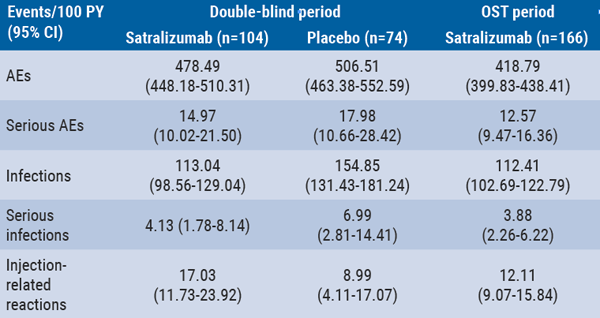Satralizumab is a humanised monoclonal antibody that binds to and blocks the IL-6 receptor and was shown to reduce NMOSD relapse risk in both the SAkuraSky (satralizumab in combination with baseline immunosuppressants), and the SAkuraStar (satralizumab monotherapy) phase 3 trials. The pooled double-blind population included 178 patients (satralizumab, n=104; placebo, n=74); 166 patients received satralizumab in the open-label extension period. The combined double-blind/extension period was defined as the overall satralizumab treatment period, in which mean exposure was around 130 weeks.
In the double-blind period, rates of adverse events (AEs) and serious AEs in the satralizumab arms were comparable to those with placebo. Infection rates were lower with satralizumab. In the double-blind and overall treatment periods, AE, serious AE, and infection rates were comparable (see Table). An AE led 4 patients (3.8%) on satralizumab and 6 (8.1%) on placebo to withdraw from the double-blind period. The injection-related reaction (IRR) rate was higher with satralizumab. IRRs were mostly mild-to-moderate and did not lead to treatment discontinuation.
Table. Pooled adverse event rates across the SAkuraSky and SAkuraStar trials [1]
 AE, adverse event; OST, overall satralizumab treatment, PY, patient year.
AE, adverse event; OST, overall satralizumab treatment, PY, patient year.- Greenberg BM, et al. Abstract EPR2140, EAN 2020.
Posted on
Previous Article
« Imaging to evaluate remyelination and neuroprotection Next Article
Eculizumab in NMOSD: the PREVENT study »
« Imaging to evaluate remyelination and neuroprotection Next Article
Eculizumab in NMOSD: the PREVENT study »
Table of Contents: EAN 2020
Featured articles
Alzheimer's Disease and Other Dementias
Non-Alzheimer’s disease pathophysiology in the elderly
Novel genetic association with resistance to ERC tau deposition
Diastolic dysfunction novel risk factor for cognitive impairment
Epilepsy
Avoidable epilepsy-related mortality remains high
How genetic testing can contribute to epilepsy management
Cenobamate effective in focal epilepsy
Sustained seizure reductions with cannabidiol for Lennox-Gastaut syndrome
Prevalence of autoantibodies in epilepsy almost 10%
Parkinson's Disease
White matter matters in Parkinson’s disease
Sleep disorders mark PD progression
Directional DBS superior to omnidirectional DBS
Stroke
Benefits of statins to prevent stroke outweigh risks
Extubation after thrombectomy: the sooner, the better
Thrombus location and length predictors of early neurological deterioration
Endovascular treatment in large vessel occlusion stroke patients treated with OAC
Early edoxaban may be safe after cardioembolic stroke
Headache and Pain
Small fibre pathology as biomarker for fibromyalgia
Migraine as a cyclical functional disorder
Reassuring real-world safety profile of 3 CGRP inhibitors
Long-term cardiovascular safety of erenumab
Real-world data for erenumab in Germany
Eptinezumab in chronic migraine and medication-overuse headache
Fremanezumab tolerability in cardiovascular patients with migraine
Effects of galcanezumab on health-related quality of life
Multiple Sclerosis
Imaging to evaluate remyelination and neuroprotection
Serum NfL predicts long-term clinical outcomes in MS
Epstein-Barr virus-targeted T-cell immunotherapy for progressive MS
High NEDA rates after 2 years of ocrelizumab
Switching from natalizumab to moderate- versus high-efficacy DMT
Results of compounds in late stages of development
Alemtuzumab efficacy and safety data of over 9 years
Fampridine treatment results in routine clinical practice
Air pollution is a possible risk factor for MS
Neuromyelitis Optica Spectrum Disorder
Genetic association studies in NMOSD needed
Eculizumab in NMOSD: the PREVENT study
Long-term safety of satralizumab consistent with double-blind periods
Neuromuscular Disorders
Biomarkers predicting motor function in SMA
Sustained benefits of avalglucosidase alfa in late-onset Pompe disease
Efficacy and safety of rituximab in refractory MG corroborated
Related Articles

September 10, 2020
Epstein-Barr virus-targeted T-cell immunotherapy for progressive MS
September 8, 2020
News on AD biomarkers
September 10, 2020
Migraine as a cyclical functional disorder
© 2024 Medicom Medical Publishers. All rights reserved. Terms and Conditions | Privacy Policy
HEAD OFFICE
Laarderhoogtweg 25
1101 EB Amsterdam
The Netherlands
T: +31 85 4012 560
E: publishers@medicom-publishers.com

